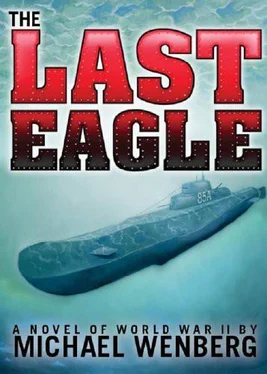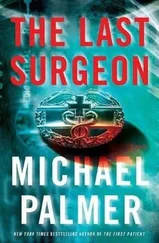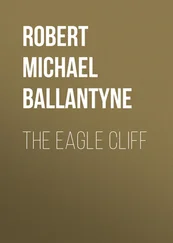Sieinski didn’t know how long he lay there, dazed, but not completely unconscious. He was aware of Ritter leaving, like a child on the edge of sleep hearing the slam of a door as his father heads for work in the darkness.
Sieinski moaned and sat up. He felt his forehead, once again tender from striking the back of the seat. His knee hurt, as well. But that seemed the worst of it. He worked his joints just in case, testing his shoulder, arms, neck. He would ache elsewhere later on, but nothing serious.
What had happened? His mind replayed the previous moments. Chase. Shots. And then he remembered The bus had been filled with the Eagle’s crew. His men. And then a sharp intake of breath, as he suddenly realized the truth. Not his men, not any longer. Ritter was right. Stripped of everything he had ever valued let him see clearly for the first time the waste and wreckage that was his life. And worst of all. They had left him behind. Sieinski began to weep. He felt once again the sweet despair of being overlooked by his friends. It was felt no different now than it had as a child twenty years earlier. They had left him behind. He caught himself. Not childhood ignorance, this time. What did he expect? He had abandoned them, left them to fend for themselves. They hadn’t left him behind, it had been his choice all along. He had been captain in name only, enamored with the rights and privileges that that rank had bestowed upon him. He had forgotten all about the responsibilities that came with it. He hadn’t taken care of his men, he hadn’t taken care of his boat, and so they had learned to do without him. His anguished sobs rang out in the darkness. What was he to do now? What would the Germans do to him when they found him? Sieinski was assaulted by a flurry of thoughts and emotions. His first inclination, as was his habit, was to find some way to protect himself. But Sieinski didn’t stop there. That was a change. He was no longer the same man he had been moments before. Despair had brought him to the bottom. But unlike many, he was not content to stay there. He couldn’t. The thought of his crew back on the Eagle filled him with a wild sense of hope and possibility. Maybe it wasn’t too late to help them?
Commander Jaak Talli was in the Eagle’s bow compartment when he heard the faint shouts drift down the passageway, the footsteps on the deck overhead sounding like a herd of kids bursting out of a classroom. He glanced at his watch. 1:20 a.m. He couldn’t imagine it was the German crew already. They were punctual to a fault. They weren’t scheduled to take over the Eagle until she had been towed out of the harbor. And that wasn’t going to happen until mid-morning. Curious, Talli headed for the forward hatch.
Most of the afternoon and evening he had spent aboard the Eagle , supervising the disarming and unloading of her torpedoes through the loading hatches near the bow and stern. It was hot, greasy, grueling work, requiring a gang of men, block and tackle and chains to hoist the deadweight of the torpedoes above deck. It was also dangerous. A slip or a false move, and the TNT-packed cylinder could easily swing to one side, crushing a hand, a leg or worse.
Despite the risks, Talli’s order had been very specific. The damn Germans were getting the submarine, but that didn’t mean she needed to be handed over fully armed. There were just two torpedoes left when he’d finally called a halt to the work. It was nearly midnight. “We’ll finish in the morning,” he said with his brevity. “Oh-seven hundred sharp!”
He’d followed the quietly grumbling men out, and then returned, curiosity drawing him back aboard more than the coat he’d left. On an impulse, he’d decided to explore the deserted vessel, looking in every nook and cranny, the haunting presence of the crew his only companions. He spent time thumbing through the captain’s log, inspecting the engines, even rummaging through a few duffel bags like a adolescent voyeur. In the control room, he took hold of the periscope, imagining himself peering across a stormy sea at a distant target.
Talli had always been a surface sailor, serving on small patrol boats mostly, only recently getting command of his own. The Estonian Navy had never been as large as her neighbors. Its duties mostly revolved around patrolling her rugged coast line and infrequent rescues. But that hadn’t stopped Talli from reading about submarines, learning as much as he could about them. Dreaming. When the Eagle appeared in the harbor, he could barely contain his excitement. What luck. It wouldn’t be difficult to get a tour of the boat, of that he was certain. And then, incredibly, he had been ordered to intern the crew and learned the submarine was to be handed over to the Nazis, his superior, Admiral Kalm, winning the wrestling match to see who could be first among many at providing favors for the Germans. The fools. Didn’t the realize it was only a matter of time before Estonia and the other Baltic states were eaten by the German or Russian wolves. It was inevitable because, as his grandfather would have said, “it is in their nature.”
By the time Talli climbed up through the forward hatch, the Polish crew was already fanning out over the Eagle’s deck, disappearing down the aft hatch, climbing up onto the deck guns.
There had been three guards on the quay. He noted in a glance that they had gathered, along with the guard from the mansion, along the edge, overlooking the Eagle . They stood together like a cluster of forgotten schoolboys, looking awkward in a game that was just about to begin. Remarkably, not one threat had been made against them, and so their rifles hung limply in their arms, barrels pointed impotently at the ground. Just a few hours earlier they had been trading cigarettes and booze with these men. Now, they simply watched them go about the business of getting the Eagle underway.
As Talli began to take it all in, he had a sudden, fleeting impulse to escape. In three steps he could be off the deck, leaping into the harbor water. A long swim underwater would take him safely away from the floodlights shining down on the Eagle . He could be back up on the quay in five minutes and on his way to finding help.
But as he watched the men take back their vessel, these feelings were pushed aside by a sense of calm of the kind he had not experienced since he was a boy, staring in awe at the stained glass windows of the town’s cathedral. Instinctively, he knew there was something deeply right about what was happening. There was nothing he could do—nothing he wanted to do.
When the last Pole stepped off the bus, its doors swung close, there was the sound of grinding gears. The bus backed off the quay, reversed direction, and then disappeared down a street angling away from the harbor. And then Talli noticed Stefan standing next to the conning tower, remembered him from before. The Pole. He had an Estonian officer, Veski, at his side. There was a pistol in Stefan’s belt.
When Stefan saw Talli, standing on the ladder, halfway out of the forward hatch, he didn’t seem surprised. He motioned him over.
“And so we meet again,” Talli said striding confidently up to Stefan. He nodded toward Veski. “I should ask what is the meaning of this… but it seems clear enough.”
Stefan nodded. “We’re taking back what is ours.”
Though he had never seen an American baseball game, Talli responded to the reality of the words like a big league manager sending signals to a batter at the plate. He exhaled loudly, took off his hat, ran his hand through his thick hair, and then put it back in place, tugging the brim.
Stefan eyed Talli. “You aren’t trying to work yourself up to try something stupid, are you?”
Читать дальше












